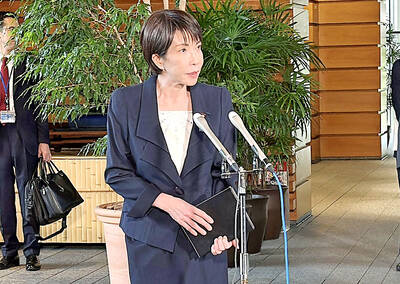The prime ministers of India and Pakistan were scheduled to meet on the sidelines of a summit in Egypt yesterday, sparking hopes of a resumption of peace talks between the nuclear rivals.
Pakistani Prime Minister Yousuf Raza Gilani and Indian Prime Minister Manmohan Singh were to hold talks in the Red Sea resort of Sharm el-Sheikh, where more than 50 heads of state are attending the developing world’s most important get-together, the Non-Aligned Movement summit.
Relations between India and Pakistan, which have fought three wars, deteriorated sharply after last year’s bombings in Mumbai, which killed 166 people and were blamed by New Delhi on the banned Pakistani militant group Lashkar-e-Taiba.
Singh has voiced hope that Pakistan will promise action against those behind the November attacks when he meets Gilani for the second high-level talks between the two sides since the bombings.
Pakistan on Wednesday expressed optimism over the talks.
“There has recently been some forward movement in our relations with India,” Gilani told summit participants. “We hope to sustain this momentum and move toward comprehensive engagement. We believe durable peace in South Asia is achievable.”
The Mumbai siege left in tatters a fragile peace process launched in 2004 to resolve all outstanding issues of conflict between the neighbors, including a territorial dispute over the divided Himalayan territory of Kashmir.
Peace “will be facilitated by the resolution of all outstanding disputes, including Jammu and Kashmir,” Gilani said.
Indian Foreign Secretary Shiv Shankar Menon has been holding talks with his Pakistani counterpart Salim Bashir since Tuesday in preparation for the meeting between the prime ministers.
Menon told a press conference on Wednesday that the talks were continuing.
“We have had good detailed discussions. We are still in the process of talking to each other,” Menon said.
Singh has voiced hope that Pakistan will promise action against those behind the attacks when he meets Gilani for only the second high-level contact between the two sides since the Mumbai bombings.
Pakistan has said that it would “probably” put the five accused of involvement in the attacks on trial this week.
More than 50 heads of state from the developing world are gathered in Sharm el-Sheikh to tackle the fallout from the global economic meltdown, with calls for a “new world order” to prevent a repeat of the crisis.

‘MOTHER’ OF THAILAND: In her glamorous heyday in the 1960s, former Thai queen Sirikit mingled with US presidents and superstars such as Elvis Presley The year-long funeral ceremony of former Thai queen Sirikit started yesterday, with grieving royalists set to salute the procession bringing her body to lie in state at Bangkok’s Grand Palace. Members of the royal family are venerated in Thailand, treated by many as semi-divine figures, and lavished with glowing media coverage and gold-adorned portraits hanging in public spaces and private homes nationwide. Sirikit, the mother of Thai King Vajiralongkorn and widow of the nation’s longest-reigning monarch, died late on Friday at the age of 93. Black-and-white tributes to the royal matriarch are being beamed onto towering digital advertizing billboards, on

Indonesia was to sign an agreement to repatriate two British nationals, including a grandmother languishing on death row for drug-related crimes, an Indonesian government source said yesterday. “The practical arrangement will be signed today. The transfer will be done immediately after the technical side of the transfer is agreed,” the source said, identifying Lindsay Sandiford and 35-year-old Shahab Shahabadi as the people being transferred. Sandiford, a grandmother, was sentenced to death on the island of Bali in 2013 after she was convicted of trafficking drugs. Customs officers found cocaine worth an estimated US$2.14 million hidden in a false bottom in Sandiford’s suitcase when

POWER ABUSE WORRY: Some people warned that the broad language of the treaty could lead to overreach by authorities and enable the repression of government critics Countries signed their first UN treaty targeting cybercrime in Hanoi yesterday, despite opposition from an unlikely band of tech companies and rights groups warning of expanded state surveillance. The new global legal framework aims to bolster international cooperation to fight digital crimes, from child pornography to transnational cyberscams and money laundering. More than 60 countries signed the declaration, which means it would go into force once ratified by those states. UN Secretary-General Antonio Guterres described the signing as an “important milestone,” and that it was “only the beginning.” “Every day, sophisticated scams destroy families, steal migrants and drain billions of dollars from our economy...

PRESSURE: Trump is expected to demand that Tokyo raise its defense spending, but Japan’s new foreign minister said the amount is less important than how it is spent Japan plans to show its determination to further build up its defense to rapidly adapt to changing warfare realities and growing tension in the region when US President Donald Trump visits Tokyo next week, Minister of Foreign Affairs Toshimitsu Motegi said. Japanese Prime Minister Sanae Takaichi’s administration is also finalizing a purchase package, including US pickups, soybeans and gas, to present to Trump, but would not commit to any new defense spending target at the meeting, a source with knowledge of the preparations said. The two leaders are to sit down in Tokyo on Monday and Tuesday next week during Trump’s first